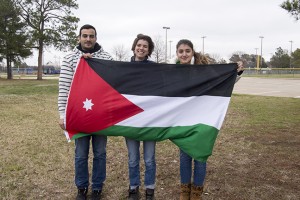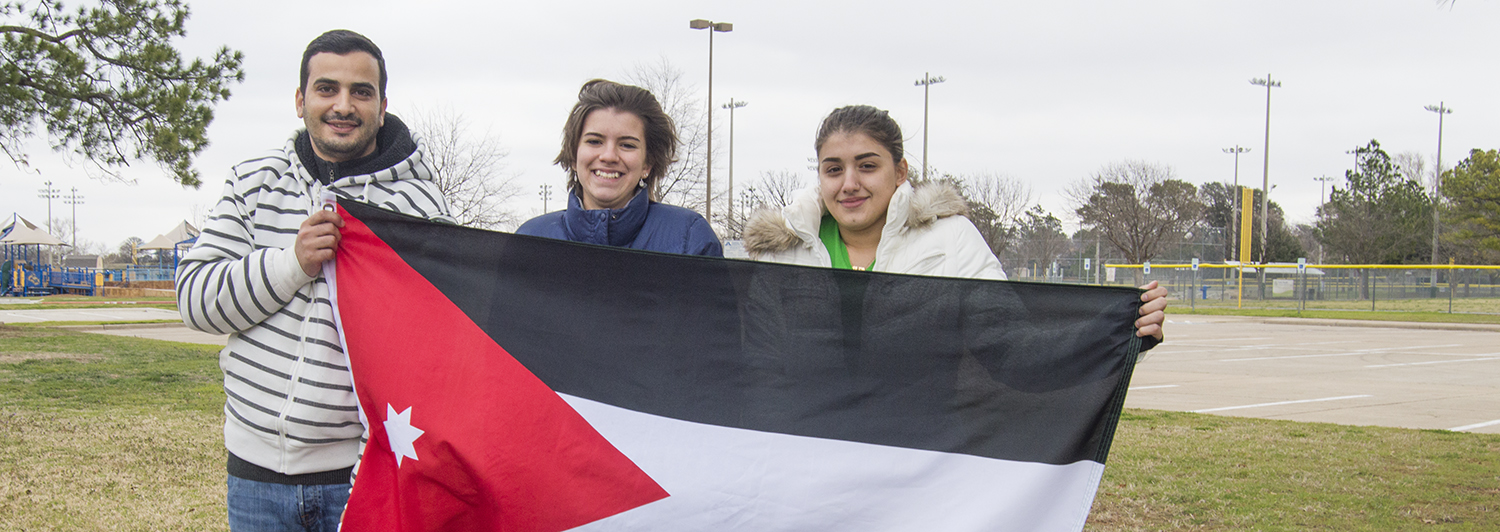By Linah Mohammad/se news editor
One of Jordan’s pilots, Lt. Moath al-Kasasbeh, was locked in a cage and burned alive. Then, his charred body was crushed under rubble as shown in a 25-minute video posted on YouTube by ISIS.

The execution of Al-Kasasbeh shook Jordanians across the world to the core. Some who had sympathized with ISIS militants are now fully against them.
“People thought ISIS was going to be a true representation of Islam,” said Alia Elmousa, a SE business management student. “But they are not!”
Yasser Elrashidy, a professor in Al-Azhar University and a visiting scholar in Dar Elsalam Mosque in Arlington condemned ISIS’ actions.
“As an Islamic scholar, I say that this abnormal, radical group does not represent Islam by any means,” he said.
Elrashidy said the quotes the militants claim to be Islamic, are weak and not true. ISIS does not embody Islamic laws regarding war and hostages.
“The prophet said,” he quoted, “‘I command you 10 things. Learn them by heart: Don’t betray, defraud (by stealing the spoils of war) or break treaties. Don’t mutilate, kill women, young children or the elderly. Do not uproot or burn palm trees. Do not cut down fruitful trees, slaughter sheep, cows or camels except for eating. You will come across people secluded in monasteries, so leave them and what they are devoted to.’ This is Islam. Not what they claim.”
Islam orders, he said, that no prisoner of war should be slain or executed. He added that Islam forbids torturing in any way, let alone by fire or by burning people alive.
“I think it was very inhumane,” Elmousa said. “Showing a video like that is very wrong. They say they are coming from the perspective of Islam and that is wrong. It has nothing to do with Islam.”
Elrashidy defined Islam as a religion of mercy, tolerance and mankind brotherhood.
According to him, the saddest part is that this is what people see of Islam, the people’s wrongdoings.
“Do not judge a religion by the people who practice it,” he said. “People aren’t perfect, but religions are.”
Elmousa did not watch the video of the burning but watched a video criticizing it.
“The video of the burning was so disturbing,” she said. “I was so scared, I couldn’t sleep at night.”
Almuthanna Obeidat, a SE computer engineering student who received training in the Royal Jordanian Air Force to become a pilot in Jordan, viewed the video multiple times. The first time, he said, he was in shock at how anybody could do such a thing to a human. The second time, he started to look for errors and faults in the video to prove its invalidity.
“It’s so inhumane for his mother, any mother, to see this happen to their child,” Elmousa said. “Honestly, it would make anyone in the world angry, no matter Jordanian or not.”
Lea Anne Almetwaly, vice president of the SE Student Government Association, was in Austin when she first heard the news. When she saw what happened to Al-Kasasbeh, she felt like she lost a family member, she said.
“I went to talk to advisers in UT Austin, so I passed by the student activities building,” she said. “I noticed they had a huge TV and they had CNN on. I looked up at the TV and I saw ‘Jordanian Pilot Burned Alive.’ I felt like I was about to fall down, like my knees weren’t holding my body weight anymore. I have never experienced a feeling like that I felt when I saw the news — A bad, bad feeling.”
Almetwaly had never been this proud of Jordanians and the way they took on this suffering.
“When the news broke out that ISIS burned Moath alive all Jordanians of different religions, races and ethnicities went out into the streets,” she said. “Jordanians stood together when they were under hardships and misery. So, no matter what happens in the future, the Jordanians will never forget how this sad happening united them.”
To understand what happened and how ISIS works, according to Obeidat, there is a need to understand how they emerged: the chaos that prevailed in Iraq after the invasion of 2003 caused the people to look for a hero, someone to avenge for them and achieve justice.
“ISIS is not the problem, but rather the new young generation that they are raising on hatred, the children whom they are militarizing,” he said. “If we don’t take ISIS out now, the world is going to be dragged in a war for hundreds of years. The solution of diplomatic talk is not an option. It is, in fact, impossible. Anyone who goes over there will never return.”
ISIS expansion might at some point reach the boundaries of the Jordanian Kingdom. Therefore, it is to the kingdom’s advantage to fight them now, according to him. The only problem is the kingdom does not have the budget to support such a war.
“One trip of an F-16 from Jordan to northern Syria, where ISIS de facto capital is costs up to $20,000 just for the fuel. One bomb costs $250,000. Jordan does not have the resources nor the budget for such a costly war. So other nations have to join the war too, at least by providing artilleries.”
In the Jordanian tribal culture, the loss of even one is not OK. The tribe will seek revenge. This is why Jordan as a government did not want to be involved in the war.
However, the execution on Al-Kasasbeh changed the plans. Jordan’s king Abdullah vowed to bombard ISIS until his country ran out of fuel and bullets.
Obeidat said if the Jordanian Army starts drafting, he would go back to fight the war against ISIS.
“I’m thinking,” Almetwaly said, “I’m thinking how this matter is much bigger than what we see or think.”

